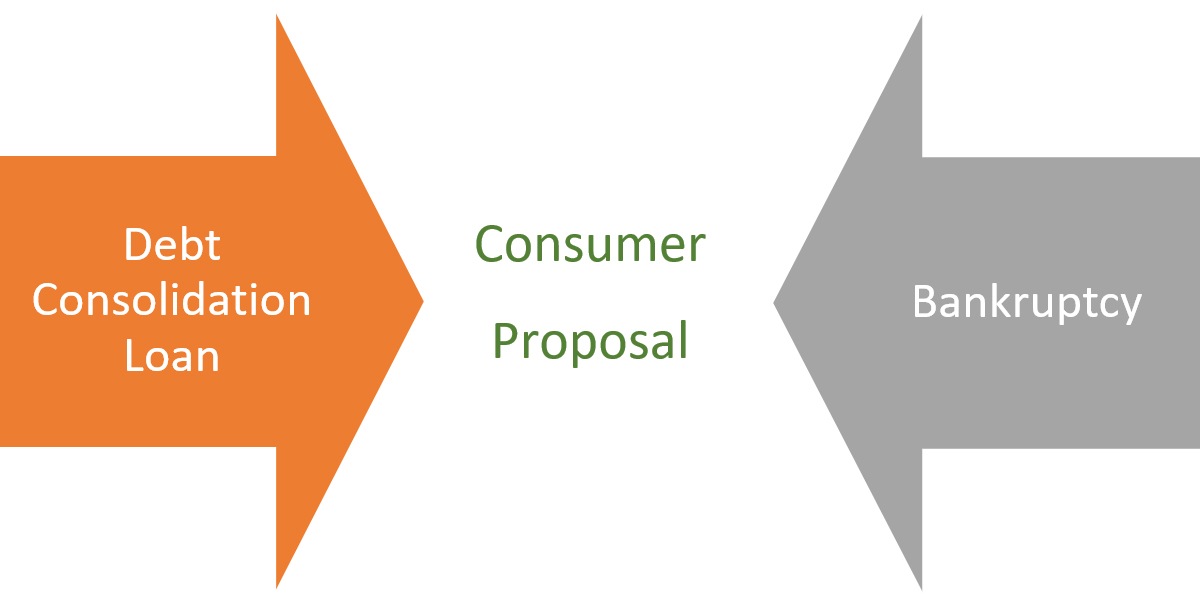
Bankruptcy and debt consolidation are two very different approaches to debt relief. Bankruptcy is a legal process that discharges your debt obligations while a debt consolidation loan restructures debt payments making them more affordable. In this article, I’ll review the differences between each option and present a third alternative – a consumer proposal. A consumer proposal provides the benefits of debt consolidation with the debt relief of bankruptcy.
Table of Contents
How debt consolidation works
Debt consolidation involves taking out a new consolidation loan to pay off multiple debts. Debt consolidation options can include an unsecured bank loan, secured loan, second mortgage or home equity loan.
The main advantage of a debt consolidation loan, if done properly, is that it saves you money helping you to get out of debt sooner. Debt consolidation is only a good option if the interest rate you pay on your consolidation loan is lower than the interest rate on your credit cards, payday loans or whatever other debts you combine. By paying less interest you can eliminate credit card debt faster.
There are risks with a debt consolidation loan. You may not qualify or may need a co-signer. Any consolidation lender will want to see you have a steady income, employment, and a good credit rating before approving the loan. You may not have enough security or collateral to support a consolidation loan.
Unlike with bankruptcy, your debts do not go away with a debt consolidation loan until you pay off your new loan in full. Your monthly payment with a debt consolidation loan may also be higher than a bankruptcy.
How bankruptcy works
Bankruptcy is a legal process where you surrender your assets in exchange for the discharge of your debts. Bankruptcy is filed through a Licensed Insolvency Trustee who will help you complete the application to go bankrupt, file your bankruptcy with the court and notify your creditors. A note that you filed for bankruptcy will appear on your credit report and remain for six years.
With personal bankruptcy, you are clearing yourself of all the debts as opposed to refinancing them through a debt consolidation loan. You don’t need to qualify to file for bankruptcy; it’s a choice you make.
Bankruptcy is best suited for an individual who cannot afford to repay their debts. Bankruptcy also provides protection from creditor actions like wage garnishments.
If this is your first bankruptcy, your bankruptcy can be completed in as little as nine months. This is extended to 21 months if you have a high surplus income.
Options between bankruptcy and debt consolidation
However, as mentioned, there is a solution available under the Bankruptcy & Insolvency Act between a debt consolidation loan and bankruptcy and that is a consumer proposal.
A consumer proposal is another way to consolidate debts without filing bankruptcy.
In the same way a debt consolidation loan groups all your debt payments, a consumer proposal can consolidate debt except this time, instead of paying all the principal debts plus interest, you’re only paying back what you offer to pay back. That’s because a consumer proposal is a form of debt settlement that is legally binding. A consumer proposal is a credit consolidation option that reduces your debt. It gives you reduced monthly payments and creditor protection.
Bankruptcy or debt consolidation. Which should I choose?
Finding the right debt management solution for any debt problem depends on your specific circumstances. Whether a debt consolidation loan or bankruptcy is right for you depends on how much you owe and how much you can afford to repay.
Remember:
- Debt consolidation does not eliminate debt while bankruptcy does
- Debt consolidation does not provide creditor protection unlike bankruptcy
- A consumer proposal provides the benefits of debt consolidation with the debt relief of bankruptcy.
If your debt load is overwhelming and you can’t afford the monthly payments on a debt consolidation loan, then bankruptcy is an option. While you may worry about the impact of a bankruptcy or consumer proposal on your credit score or record, you need to consider an alternative that will give you the fresh start you need.
Contact us today for a free consultation to discuss the pros and cons of consolidating your debt with a loan versus bankruptcy or perhaps an alternative of making a consumer proposal. Let’s get started on creating your debt-free plan.






